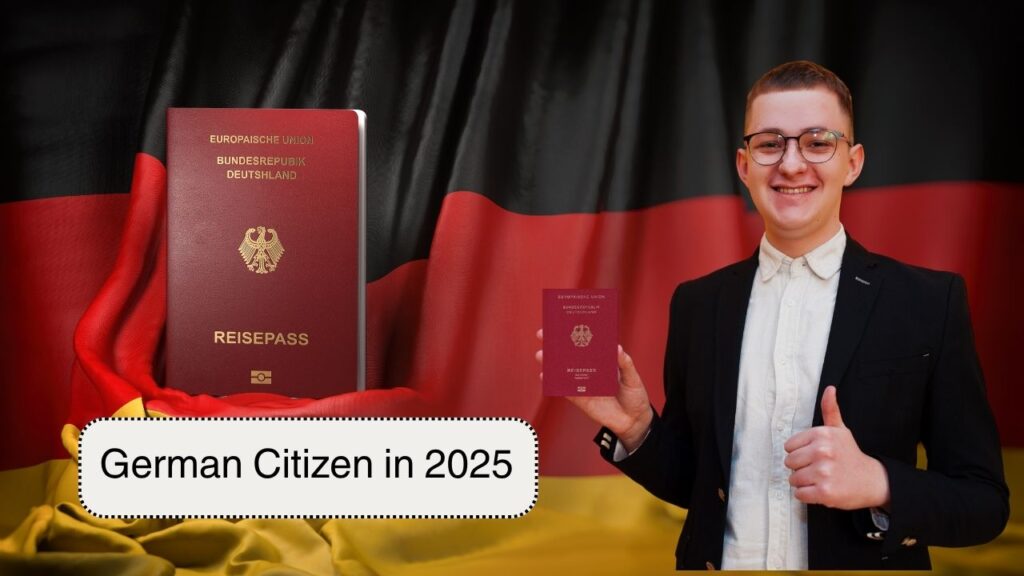German citizen – For many, the dream of calling Germany home, truly and officially, culminates in acquiring German citizenship. In 2025, with recent updates to the Nationality Law, this dream is more accessible than ever for many. As someone who has seen countless individuals successfully navigate this rewarding journey, I can tell you that while it requires dedication and preparation, it is entirely achievable. This guide is designed to empower you with comprehensive, actionable insights to understand and successfully complete all requirements to become a German citizen in 2025.

Understanding the New Landscape of German Citizenship
Germany has modernized its nationality law, making the path to citizenship more streamlined and, for many, significantly faster. The most notable change, effective June 27, 2024, is the reduction of the general residency requirement from eight years to five years. Furthermore, dual citizenship is now broadly permitted, meaning you no longer typically need to renounce your previous nationality to become a German citizen. These changes reflect Germany’s commitment to integration and attracting skilled individuals.
Key Requirements to Become a German Citizen in 2025
The process of naturalization, while simplified, still involves meeting several specific criteria. These requirements ensure that new citizens are well-integrated into German society and uphold its democratic values.
1. Residency: Your Foundation in Germany
To become a German citizen, you must demonstrate a legal and habitual residence in Germany for a specific period. As of 2025, the general requirement is five years of legal residence.
However, there’s a faster track for those who demonstrate exceptional integration:
- Three-Year Fast Track: If you can prove “special integration achievements,” you may be eligible for naturalization after just three years of legal residency. This typically involves:
- High German language proficiency: Demonstrating C1 level German skills.
- Exceptional performance in your job, education, or vocational training.
- Significant voluntary work in social, cultural, or charitable organizations.
It’s crucial to note that while the three-year path was introduced, there have been discussions about its potential abolition in future legislative changes. As of now, it remains a possibility for those who qualify, but it’s always wise to check the latest updates from official sources.
2. Valid Residence Permit
You must hold a permanent right of residence or a long-term residence permit that leads to naturalization. Common qualifying permits include:
- Residence permit for skilled workers (e.g., EU Blue Card)
- Family reunification permit
- Residence permits for investors, freelancers, or business owners
Your electronic residence permit (eAT) serves as proof of this.
3. Financial Independence: Supporting Yourself and Your Family
A cornerstone of German citizenship is the ability to financially support yourself and any dependents without relying on state benefits (such as Bürgergeld or unemployment benefit II). You’ll need to provide evidence like:
- Employment contracts
- Payslips
- Income tax assessments
There are some exceptions to this rule, for instance, for certain former “guest workers” or if recourse to benefits is due to circumstances beyond your control.
4. German Language Proficiency (B1 Level)
Demonstrating sufficient German language skills is non-negotiable. The standard requirement is a B1 level according to the Common European Framework of Reference for Languages (CEFR). This covers both oral and written communication.
You can prove your B1 language skills through various means:
- A certificate from the Federal Office for Migration and Refugees (BAMF) confirming successful completion of a language course (e.g., Deutsch-Test für Zuwanderer – DTZ).
- Completion of at least four years at a German-speaking school.
- A lower secondary school leaving certificate (Hauptschulabschluss).
- Proof of reaching the tenth grade of secondary school.
- A university degree certificate from a German university.

5. Knowledge of German Legal System and Society
To become a German citizen, you must also demonstrate a basic understanding of Germany’s legal system, society, and way of life. This is typically proven by passing the Naturalization Test (Einbürgerungstest) or the “Life in Germany” test.
The test consists of 33 multiple-choice questions, covering topics like:
- Elections and voting principles
- Fundamental rights and human rights
- Democracy and the system of government
- History and responsibility (including Germany’s special historical responsibility, particularly for the protection of Jewish life, and the rejection of aggressive war)
- People and society
You need to answer at least 17 questions correctly to pass. If you’ve completed a German school or university degree, your certificate might exempt you from this test.
I’ve seen many successful applicants dedicate time to thoroughly studying for this test, often utilizing online practice simulators. It’s not just about memorizing facts; it’s about understanding the core values that underpin German society.
6. Clean Criminal Record
You must have a clean criminal record. Serious criminal offenses are generally an obstacle to naturalization. Minor offenses, such as fines up to 90 daily rates or suspended sentences up to three months, may not always be an obstacle, but it’s crucial to disclose all criminal offenses truthfully.
7. Declaration of Loyalty
As part of the application, you will sign a declaration of commitment to Germany’s free and democratic constitutional order (Grundgesetz). This also includes acknowledging Germany’s historical responsibility. This declaration is a serious commitment to the values and principles of the Federal Republic of Germany.
8. Clarification of Identity and Previous Nationality
You will need to provide valid identity documents, such as a passport or identity card. With the new law, retaining your previous nationality is generally allowed, but you may still need to clarify your current citizenship status.
The Application Process: Step-by-Step
Once you meet the eligibility criteria, the application process for German citizenship follows a structured path:
- Gather Your Documents: This is perhaps the most critical step. You’ll need a comprehensive set of documents, including:
- Valid passport or identity card
- Birth certificate
- Marriage certificate (if applicable)
- Proof of residence in Germany for the required period (e.g., pension insurance records, payslips, university enrollment certificates, lease agreements)
- Proof of financial independence (employment contract, payslips, tax assessments)
- German language certificate (B1 or C1, depending on your path)
- Naturalization Test certificate or relevant educational degree
- Completed application form
- Signed declaration of loyalty
- Biometric photographs
- Contact Your Local Nationality Authority (Staatsangehörigkeitsbehörde): This is where you will submit your application. You can find the relevant office for your town or municipality. Some authorities also offer online application portals.
- Submit Your Application: Present your completed application form and all supporting documents. Be prepared for a personal interview, where you may be asked further questions to confirm your intent and verify your integration. “The journey to become a German citizen is a marathon, not a sprint. Patience and meticulous preparation are your best allies.” – An anonymous applicant, successfully naturalized in 2024.

- Pay the Application Fees: The standard fee for naturalization is €255 per adult. For minors naturalized with a parent, it’s €51 per child. Fee payment procedures vary by authority; some require payment at the beginning, others later in the process.
- Await Processing and Decision: The processing time can vary significantly, often taking 18 months or longer. Authorities will review your application and may request additional documents if needed.
- Oath of Allegiance and Certificate of Naturalization: Upon approval, you will be invited to a naturalization ceremony where you will take an oath of allegiance to the German constitution and receive your certificate of naturalization. This is a moment of pride and a significant milestone!
Dual Citizenship in 2025
One of the most exciting developments for those looking to become a German citizen in 2025 is the general allowance of dual citizenship. This means you will typically no longer need to give up your previous nationality. This policy change recognizes the increasing global interconnectedness and allows individuals to maintain ties to their country of origin while fully integrating into German society.
Maintaining Your Momentum: Tips for Success
- Start Early: Begin gathering documents and improving your German language skills well in advance.
- Seek Guidance: Don’t hesitate to consult with legal professionals specializing in German immigration law if you have complex circumstances.
- Engage with the Community: Participating in local clubs, volunteer work, or community events can help you integrate and demonstrate your commitment to German society.
- Stay Informed: Keep an eye on official government websites for any further updates to the nationality law or application procedures.
The journey to become a German citizen is a profound step, signifying not just a change in legal status, but a deeper connection to a vibrant and welcoming society. With the updated laws in 2025, the path is clearer and more accommodating. By understanding the requirements, meticulously preparing your application, and embracing the process of integration, you are well on your way to obtaining your German passport and unlocking a world of new opportunities. Start preparing your documents and embracing the rich culture – your German future is within reach!
FAQ
Q1: Can I apply for German citizenship if I’m still studying in Germany?
A: Yes, students can count their years of study towards the residency requirement, provided they transition to a long-term residence permit after completing their education that qualifies for naturalization. Student visas generally do not directly lead to naturalization.
Q2: What if I don’t have a B1 German language certificate but have lived in Germany for a long time?
A: In some exceptional cases, such as for the “guest worker” generation or individuals with certain illnesses or disabilities, the B1 language requirement might be relaxed to basic oral communication. However, for most applicants, a B1 certificate is mandatory.
Q3: What is the significance of the “Declaration of Loyalty” in the application process?
A: The Declaration of Loyalty is a formal commitment to the fundamental principles of the German Basic Law, including human dignity, equality, and the democratic order. It underscores your acceptance of and adherence to Germany’s constitutional values and its historical responsibility.










